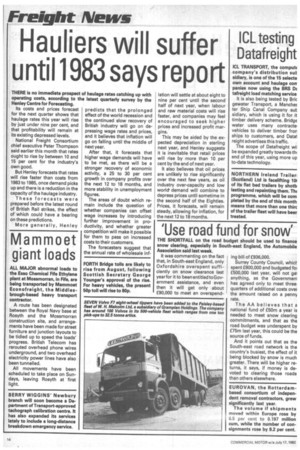Freight News
Page 8

If you've noticed an error in this article please click here to report it so we can fix it.
Hauliers ill if
unti11983 says report
THERE is no immediate prospect of operating costs, according to the Henley Centre for Forecasting.
Its costs and prices forecast for the next quarter shows that haulage rates this year will rise by just under nine per cent, and that profitability will remain at its existing depressed levels.
National Freight Consortium chief executive Peter Thompson said earlier this month that rates ought to rise by between 10 and 15 per cent for the industry's own good.
But Henley forecasts that rates will rise faster than costs from 1983 to 1985, once demand picks up and there is a reduction in the capacity of the haulage industry.
These forecasts were prepared before the latest round of British Rail strikes, the effect of which could have a bearing on these predictions.
More generally, Henley predicts that the prolonged effect of the world recession and the continued slow recovery of British industry will go on depressing wage rates and prices, and it believes that inflation will go on falling until the middle of next year.
After that, it forecasts that higher wage demands will have to be met, as there will be a stronger recovery of economic activity, a 25 to 30 per cent growth in company profits over the next 12 to 18 months, and more stability in unemployment figures.
The areas of doubt which remain include the question of whether companies can offset wage increases by introducing further improvement in productivity, and whether greater competition will make it possible for them to pass on increased costs to their customers.
The forecasters suggest that the annual rate of wholesale inf lation will settle at about eight to nine per cent until the second half of next year, when labour and raw material costs will rise faster, and companies may feel encouraged to seek higher prices and increased profit margins.
This may be aided by the expected depreciation in sterling next year, and Henley suggests it is inevitable that retail prices will rise by more than 10 per cent by the end of next year.
It also believes that oil prices are unlikely to rise significantly over the next few years, as oil industry over-capacity and low world' demand will combine to depress prices until sometime in the second half of the Eighties. Prices, it forecasts, will remain steady, allowing for inflation, for the next 12 to 18 months.
















































